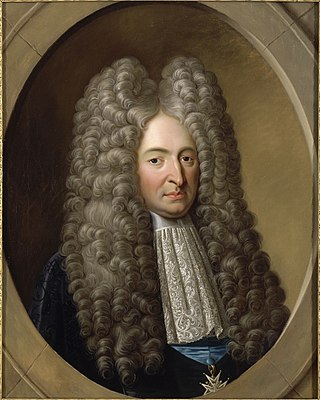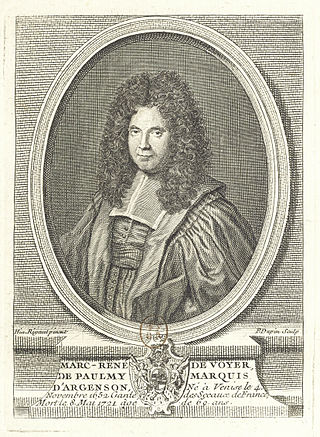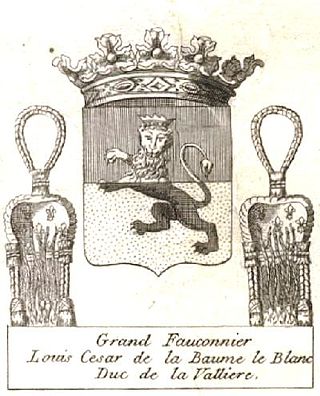
Nicolas Fouquet, marquis de Belle-Île, vicomte de Melun et Vaux was the Superintendent of Finances in France from 1653 until 1661 under King Louis XIV. He had a glittering career, and acquired enormous wealth. He fell out of favor, accused of peculation and lèse-majesté. The king had him imprisoned from 1661 until his death in 1680.

Jean-Baptiste Colbert was a French statesman who served as First Minister of State from 1661 until his death in 1683 under the rule of King Louis XIV. His lasting impact on the organization of the country's politics and markets, known as Colbertism, a doctrine often characterized as a variant of mercantilism, earned him the nickname le Grand Colbert.

Michel Chamillart or Chamillard was a French statesman, a minister of King Louis XIV of France.
An intendant was, and sometimes still is, a public official, especially in France, Spain, Portugal, and Latin America. The intendancy system was a centralizing administrative system developed in France. In the War of the Spanish Succession of 1701 to 1714 the French royal House of Bourbon secured its hold on the throne of Spain; it extended a French-style intendancy system to Spain and Portugal - and subsequently worldwide through the Spanish Empire and Portuguese Empire. Regions were divided into districts, each administered by an intendant. The title continues in use in Spain and in parts of Spanish America for particular government officials.

Abel Servien, marquis de Sablé et de Boisdauphin and Comte de La Roche des Aubiers was a French diplomat who served Cardinal Mazarin and signed for the French the Treaty of Westphalia. He was an early member of the noblesse de robe in the service of the French state.

Marc-René de Voyer, Marquis de Paulmy and marquis d’Argenson was a French politician.
The Bâtiments du Roi was a division of the Maison du Roi in France under the Ancien Régime. It was responsible for building works at the King's residences in and around Paris.
The Secretary of State of the Maison du Roi was the secretary of state in France during the Ancien Régime and Bourbon Restoration in charge of the Département de la Maison du Roi. The exact composition of the ministry and the secretary's duties changed several times over the Early Modern period, but in general, the Département de la Maison du Roi oversaw four main areas: the "Maison du Roi", the "Bâtiments du Roi", the General Affairs of the Clergy, Affairs of the RPR, and the administration of the capital city of Paris and the provinces. The post later reappeared as the Minister for the Maison du Roi.
The Controller-General or Comptroller-General of Finances was the name of the minister in charge of finances in France from 1661 to 1791. It replaced the former position of Superintendent of Finances, which was abolished with the downfall of Nicolas Fouquet. It did not hold any real political power until 1665, when First Minister Jean-Baptiste Colbert, who had acted upon financial matters since Fouquet's embezzlement charge, was appointed to the office.
The Conseil du Roi, also known as the Royal Council, is a general term for the administrative and governmental apparatus around the King of France during the Ancien Régime designed to prepare his decisions and to advise him. It should not be confused with the role and title of a "Conseil du Roi", a type of public prosecutor in the French legal system at the same period.

The ancien régime, now a common metaphor for "a system or mode no longer prevailing", was the political and social system of the Kingdom of France that the French Revolution overturned through its abolition in 1790 of the feudal system of the French nobility and in 1792 through its execution of the king and declaration of a republic.

The Grand Falconer of France was a position in the King's Household in France from the Middle Ages to the French Revolution.

Michel de Marillac was a French jurist and counsellor at the court of Louis XIII of France, one of the leading dévots. His uncle was Charles de Marillac, Archbishop of Vienne and a member of the king's council, the Conseil du Roi. A member of the circle of Marie de' Medici, he was arrested after the Queen Mother's flight in 1631 and died in prison.
A Colonel General was an officer of the French army during the Ancien Régime, the French Revolution, the Napoleonic era and the Bourbon Restoration.

René de Longueil, marquis (1658) de Maisons (1596–1677), le président de Maisons, was Surintendant des Finances under Louis XIV. He built the Château de Maisons.

Nicolas de Neufville, 1st Duke of Villeroy was a French nobleman and marshal of France. He was marquis then 1st duke of Villeroy and peer of France, marquis d'Alincourt and lord of Magny, and acted as governor of the young Louis XIV. His son François succeeded him as duke. He was the lover of Catherine-Charlotte de Gramont.
The Intendants des finances were intendants or agents of France's financial administration under the Ancien Régime.

François Sublet de Noyers was a French statesman and diplomat during the 17th Century. Closely associated with Cardinal de Richelieu, he derived his position and political weight from the Cardinal's consistent patronage, was a secretary of state to Louis XIII, and a member of his Conseil du Roi. He was a knowledgeable patron of the arts.
Barthélemy Hervart or Herwart was a Huguenot banker. He saved the French monarchy on several occasions during the Fronde, the series of civil wars in France in the mid-17th century, by means of important loans, and during the period of the fall of Louis XIV's Superintendent of Finance Nicolas Fouquet.
Events from the year 1624 in France.











